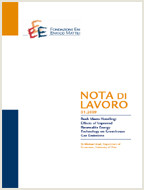The Rise and Fall of the Great Fish Pact under Endogenous Risk of Stock Collapse

Date
23.06.2015
23.06.2015
Authors
Adam N. Walker (Environmental Economics and Natural Resources Group – Wageningen University); Hans-Peter Weikard (Environmental Economics and Natural Resources Group – Wageningen University); Andries Richter (Environmental Economics and Natural Resources Group – Wageningen University, Centre for Ecological and Evolutionary Synthesis (CEES) – The Department of Biosciences – University of Oslo)
JEL Code
C72, C73, Q22
C72, C73, Q22
Keywords:
Coalition Stability, Dynamic Games, Endogenous Risk, Fish Stock Collapse, Fish War, Renewable Resource Exploitation
Coalition Stability, Dynamic Games, Endogenous Risk, Fish Stock Collapse, Fish War, Renewable Resource Exploitation
Publisher
Climate Change and Sustainable Development
Climate Change and Sustainable Development
Editor
Carlo Carraro
Carlo Carraro
Risk of stock collapse is a genuine motivation for cooperative fisheries management. We analyse the effect of an endogenously determined risk of stock collapse on the incentives to cooperate in a Great Fish War model. We establish that equilibrium harvest strategies are non-linear in stock and find that Grand Coalitions can be stable for any number of players if free-riding results in a total depletion of the fish stock. The results thus show conditions under which a Great Fish War becomes a Great Fish Pact. However, this conclusion no longer holds upon dropping the standard assumption that payoffs are evaluated in steady states. If payoffs in the transition between steady states are included, the increased incentives to deviate offset the increased benefits from cooperation due to the presence of endogenous risk and the Great Fish Pact returns to being a Great Fish War.
***
Suggested citation: Walker, A. N., Weikard H.-P., Richter, A., (2015), ‘The Rise and Fall of the Great Fish Pact under Endogenous Risk of Stock Collapse’, Nota di Lavoro 60.2015, Milan, Italy: Fondazione Eni Enrico Mattei
